Published May 2023 | Updated November 2025
Jute rugs are a perennial favorite in the interior design world. Our clients come back to us year after year asking for these beautiful, textural weaves. But is a jute rug right for you? In our 30 years of selling natural fiber rugs, we have learned a lot about jute—both the good and the not-so-good—and in this jute rug guide, we share everything you need to know about this natural material.
To start, we’ve included a pros and cons comparison table to help you quickly evaluate whether jute is the best fit for your space. From there, we’ll explore the characteristics of jute, its performance, how to care for it, and which design styles complement jute. We believe there is a perfect application for this natural fiber in every home. Let us help you find the right application for your jute rug or help you identify a smart alternative.
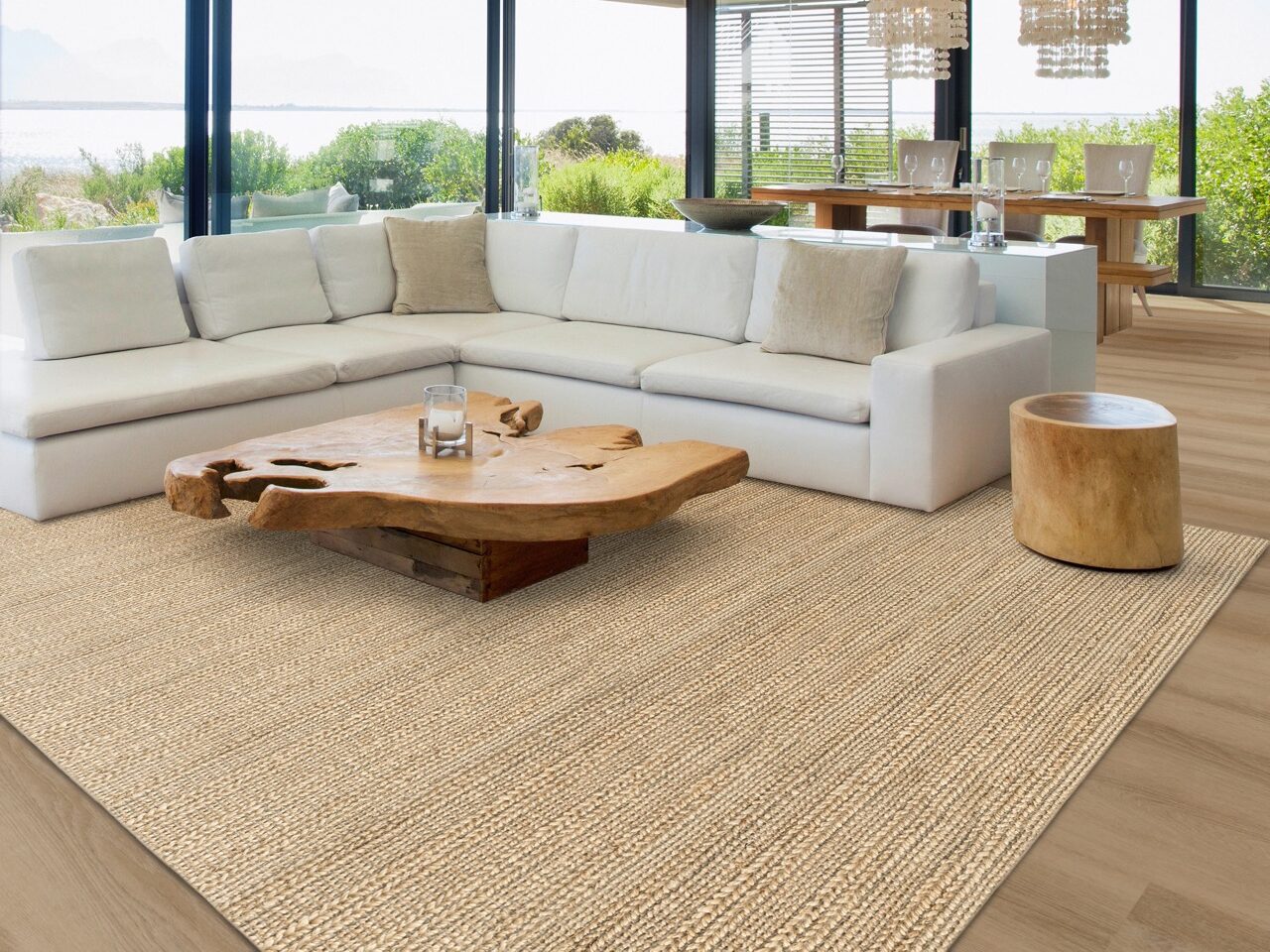
Jute Rugs: The Pros & Cons Comparison Table
Jute is an intriguing rug material. It has a natural softness, distinctive luster, intriguing woven patterns, and a great eco story. Jute rugs are affordable and offer a neutral foundation. As a result, they are the perfect accessory for design experimentation.
To help you decide if a jute rug is right for you, check out our pros and cons list below. If you want to dive deeper into each topic, follow the links for more information.
| PROS | CONS |
|---|---|
| Aesthetics Jute rugs add natural texture, visual interest, and a neutral canvas to interior design. | Shedding A jute rug sheds, especially when it is new. It needs frequent vacuuming. |
| Sustainable Jute is an eco-friendly choice, made from the Cochorus plant which grows quickly without pesticides | Stains Easily Natural fibers stain easily, sometimes even from water. A busy home with children or pets might not be the best match. |
| Biodegradable At the end of its useful life, jute fibers biodegrade and break down instead of sitting in a landfill. | Maintenance A jute carpet requires consistent vacuuming and fast cleanup of spills to look fresh. |
| Affordable Luxury Jute rugs are budget-friendly and make a big impact without a big price tag. | Indoor Only Jute rugs are not suitable outdoors and may fade in direct sunlight. |
| Soft Underfoot Jute fibers are soft, making jute rugs welcome in bedrooms or other rooms meant for relaxing. | Limited Design Range Jute rug designs offer fewer colors and patterns compared to wool or synthetic rugs. |
| Customize You can create a custom-sized jute rug with your choice of border for a perfect fit. | Moisture Sensitive If wet, jute rugs are prone to mold and mildew in humid or damp conditions. |
FAQ About Jute Rugs
What is jute?
Jute is a natural fiber harvested from the stalks of the Corchorus plant that grows in the monsoon climates of India and Bangladesh. Jute fibers are bast fibers, which means they grow in bundles inside the stem of the plant.
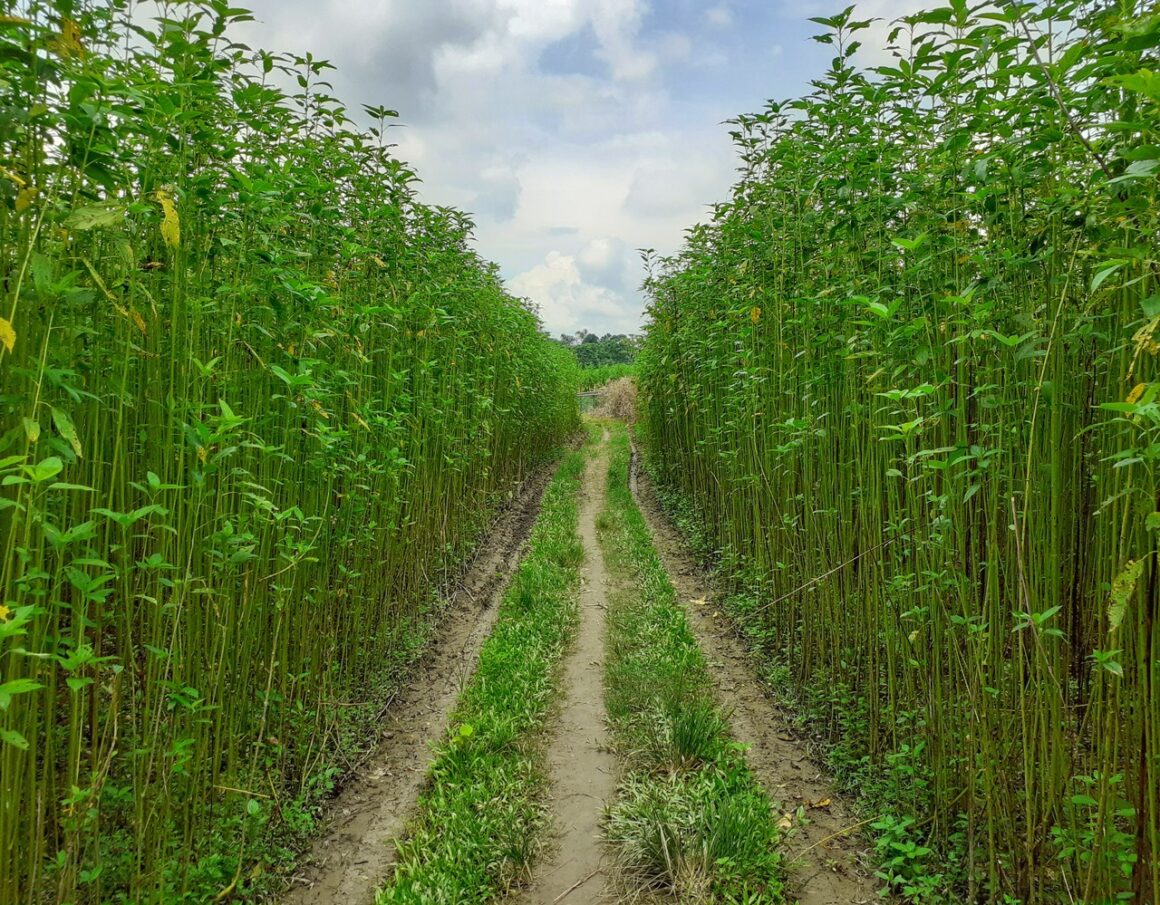
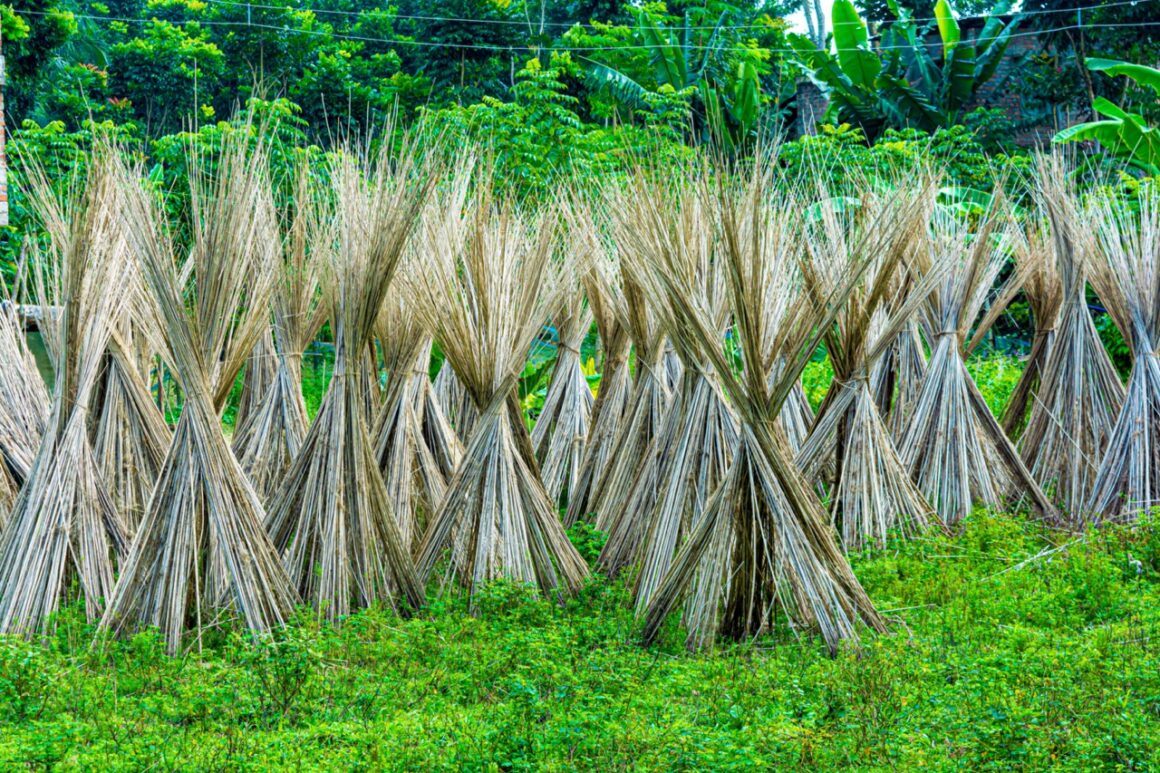
In a process called retting, the fibers are separated from the stalks and subjected to moisture treatments (like soaking in water). This process breaks down cellulose and softens the fibers. Next, the jute fibers are bundled together and set out to dry before being utilized for various jute products. The tropical climate and the retting process transform jute into one of the softest natural fibers in the flooring market.
Do jute rugs shed?
Yes, jute rugs shed a lot, especially when they are new. Jute’s unique softness comes with a price—the price of routine maintenance. Here are some of our tips for dealing with the shedding:
- Regular vacuuming with a strong suction keeps jute debris to a minimum. Don’t use a beater bar because that can damage the soft jute fibers.
- Vacuum underneath the rug as well to collect loose fibers and debris that have worked their way down.
- If you place your jute rug on top of a dark tile or hardwood floor, loose jute fibers will be more visible, requiring more frequent sweeping or vacuuming.
- Get a high-quality rug pad and place it underneath your jute rug. This will reduce surface friction and shedding. Plus, it increases cushioning and absorbs noise.
Is there a jute rug that doesn’t shed?
A tightly woven jute will shed less than a chunkier jute. If you desire the natural fiber look for your flooring but don’t want shedding, then a seagrass rug is an option. See images below. Seagrass fibers have a smooth texture and don’t shed much. And although a seagrass rug is not as soft as jute, we think its smooth texture, natural color, and classic construction make it a great alternative to jute.
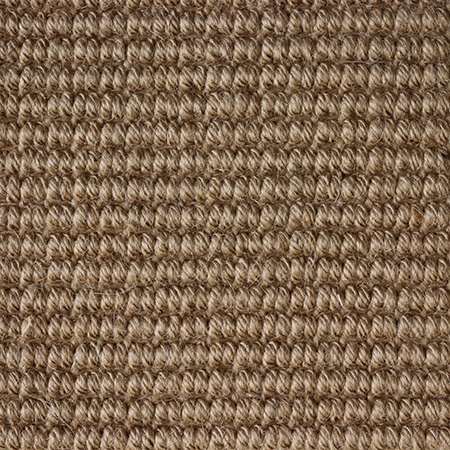
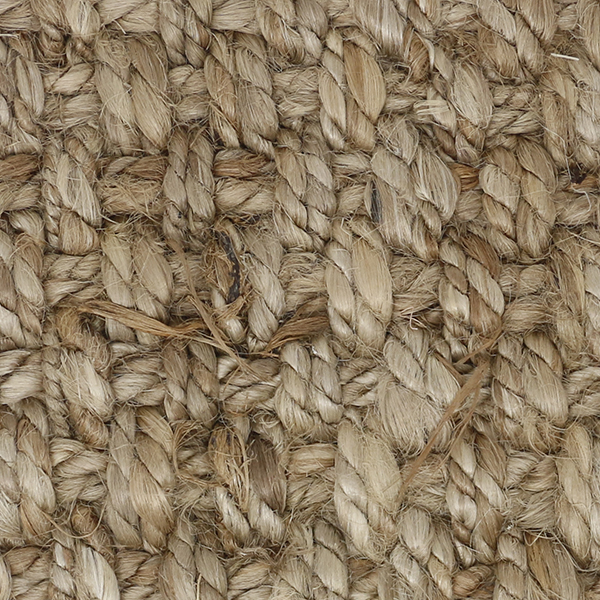
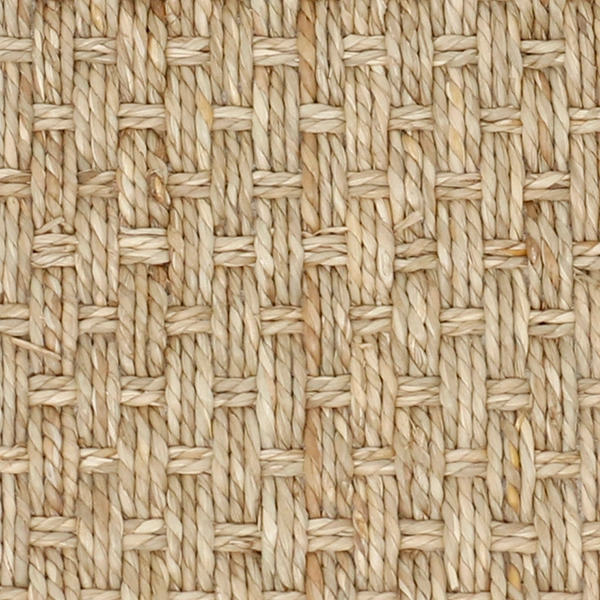
What is the difference between sisal, seagrass, coir, jute and abaca? is a great resource for comparing natural fiber rugs.
Are jute rugs soft?
Yes, jute rugs are soft, especially in comparison to sisal or seagrass. They feel nice under your feet and add a layer of cushion and warmth to hardwood or tile floors. The chunkier jute rugs give your feet a little massage with each step while adding a texture-rich visual element to any space.
Can jute rugs get wet?
Our quick answer: no. Please avoid getting your jute rugs wet! Water releases oils in jute that will brown the fiber during the drying process. This presents a challenge not only for cleaning spills, which we address later in this post, but also for the perfect placement of your jute rug.
- Do not place your newly purchased jute rug in moist environments or where spills are likely to occur. Cross bathrooms, kitchens, mudrooms or uncovered patios off your jute rug list.
- Do not place your jute rug in humid environments. Moisture combined with warmth makes jute rugs susceptible to mold and mildew, decreasing the strength of the fiber.
- Have A/C? If you have a climate-controlled environment, then a jute rug should fair fine.
What kind of natural fiber rug is okay in humid or spill-prone conditions?
Since natural fiber rugs don’t like to get wet, a synthetic natural-look rug is a better choice. Many of our synthetic sisals are woven from polypropylene, ECONYL®, nylon, or poly silk, and perform well in humid environments.

These faux sisals mimic the look of traditional sisal while being soft underfoot and easy to clean. For a modern look or a colorful indoor-outdoor rug, check out our outdoor rugs collection.
image: RAVENNA | cedar
Can jute rugs go outside?
In general, keep your jute indoors. As mentioned above, jute doesn’t hold up well in warm and humid environments. Water or any other spill can stain a jute rug. Jute is the least durable natural fiber and deteriorates quickly when exposed to the elements. There is one scenario in which a jute rug outside would be okay: if your patio is covered and you live in a dry climate.
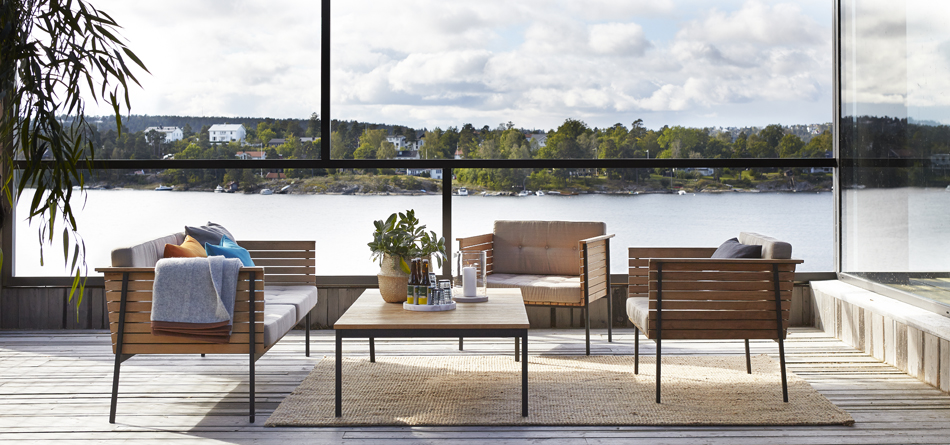
What rugs can go outdoors?
An outdoor rug should be durable, water repellent, and easy to clean. If it is made from UV-stabilized yarns, then your investment will last even longer.

UV-stabilized yarns retain dyed colors and vibrancy longer than non-UV-stabilized yarns. Many of our outdoor carpets and rugs are crafted with UV-stabilized materials and built for the outdoors. Take a look at our expansive outdoor rug collection and find rugs with muted tones or colorful patterns. We offer a style for any taste.
image: LYRA | oat nut
Jute’s Color Range
A jute rug has a limited color range, with earthy tones that range from alabaster to darker tans and blend with almost any color theme. Our collection of jute rugs has chunky braided rugs, classic bouclés, and tightly woven herringbone rugs.
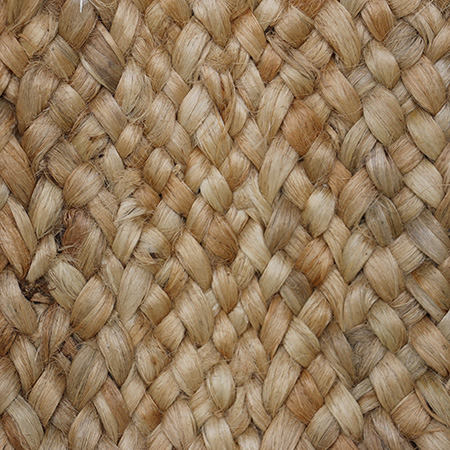


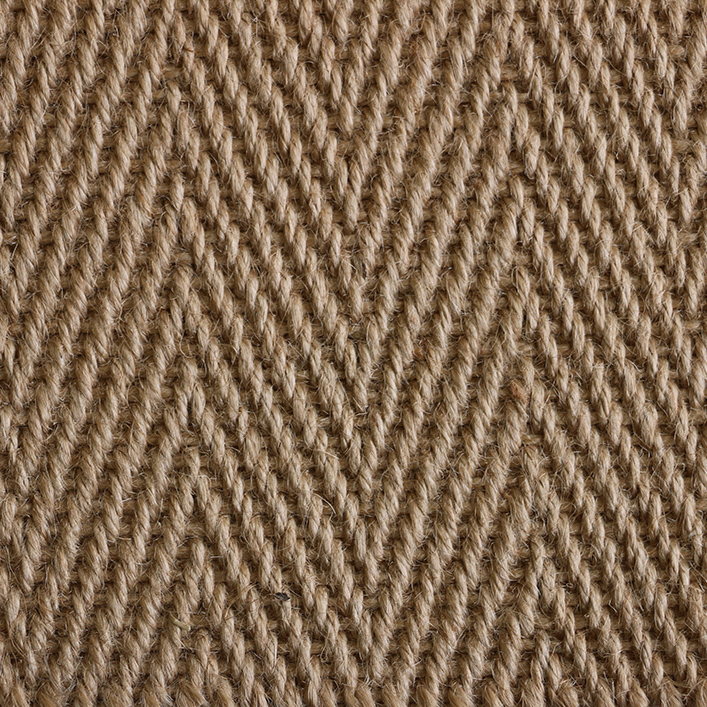
What kinds of borders are available for a jute area rug?
You can customize a jute area rug to perfectly match your decor. A simple serge, a contrasting or complementary cloth border, or the unique jute braid are all wonderful binding choices for jute. Head to our Borders page for more details.
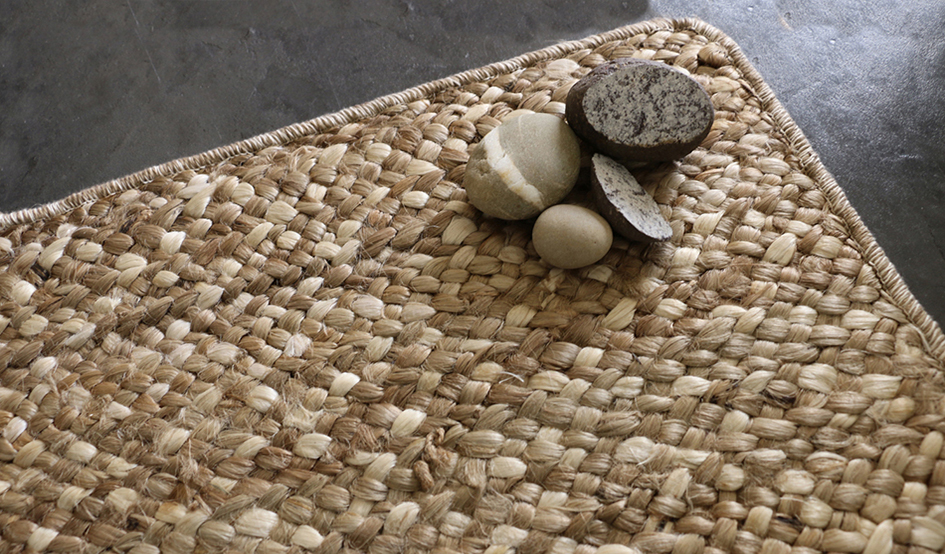
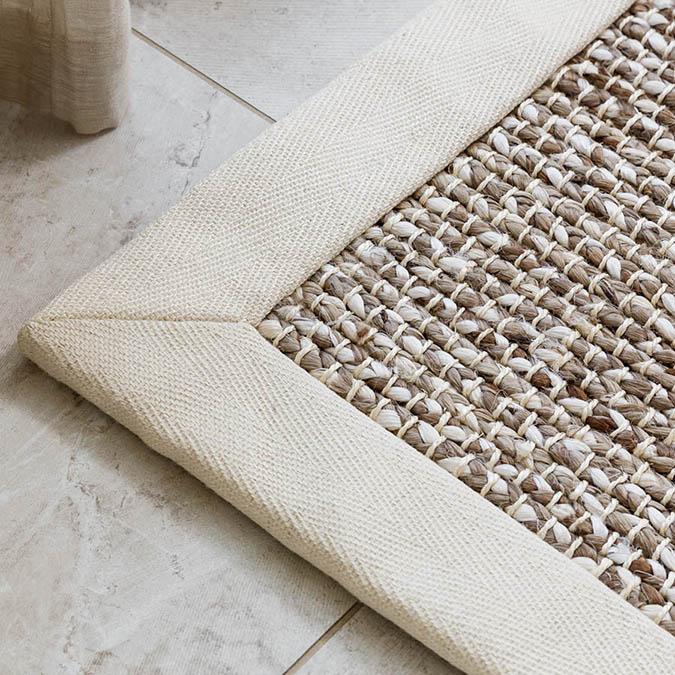
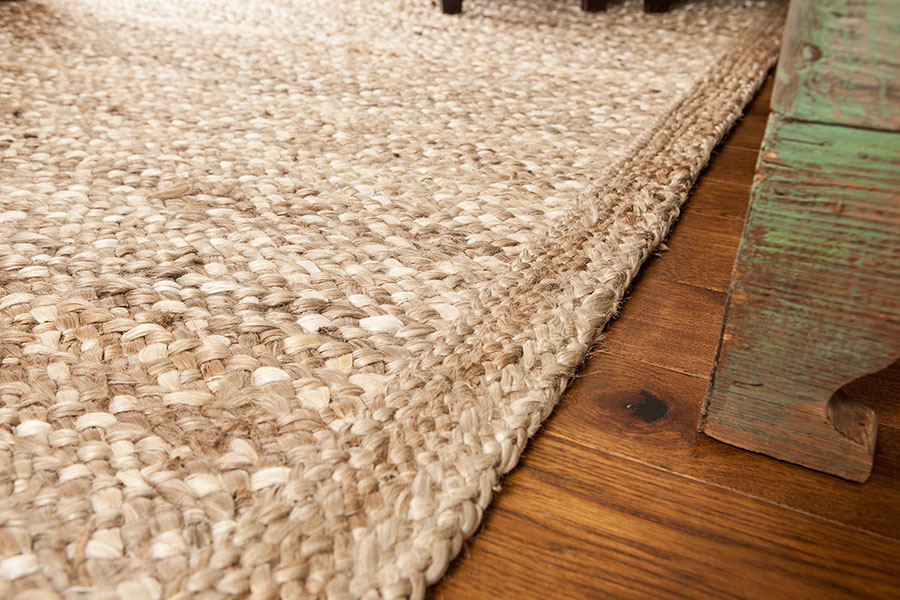
Are jute rugs eco-friendly?
Jute is a fast-growing, rain-fed crop with little need for fertilizer or pesticides. A Corchorus crop can grow within 90-100 days and farmers can plant multiple crops a year on the same piece of land. Jute fibers are biodegradable, compostable, and leave no toxic substances behind.
Looking for more eco-friendly flooring options?
Our Eco-Friendly Collection and our EarthGentle™ categories make it easy to find the best rug for your needs.
Are jute rugs good for dogs or other pets?
While jute is the softest of the natural rug fibers—and pets love soft—it’s not ideal for homes with pets. Jute can trap odors, absorb accidents, and fray under claws. If durability, cleanability, and comfort are musts, try one of these pet-friendly alternatives:
- SynSisal® Looks like natural sisal, but made from soft, sustainable ECONYL®. Easy to clean and great for high-traffic areas.
- Woven Vinyl Undeniably easy to clean and available in classic patterns like basketweave or stripes.
- Polypropylene Soft, stain-resistant, and resilient—these synthetic options are perfect for active households with pets.
Are jute rugs good for allergies?
It depends on the allergy. Jute rugs are untreated and non-toxic, but they do shed, which can stir up dust or dander. A tightly woven jute helps keep allergens on the surface for easy vacuuming—just be sure to use a HEPA filter and clean regularly. For extra-sensitive households, consider a low-VOC option like SynSisal® or wool.
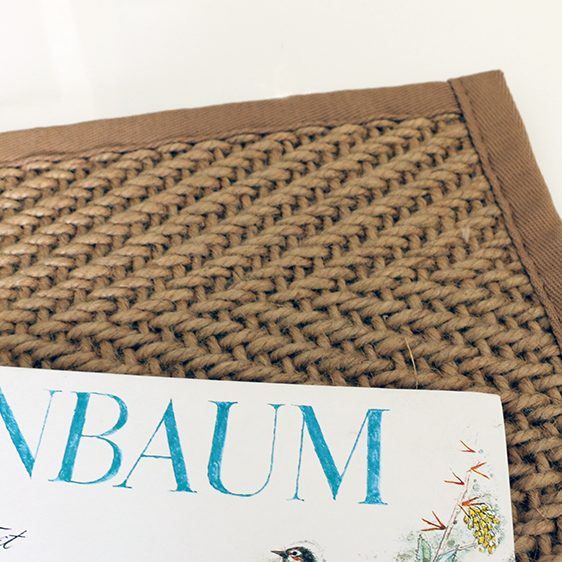
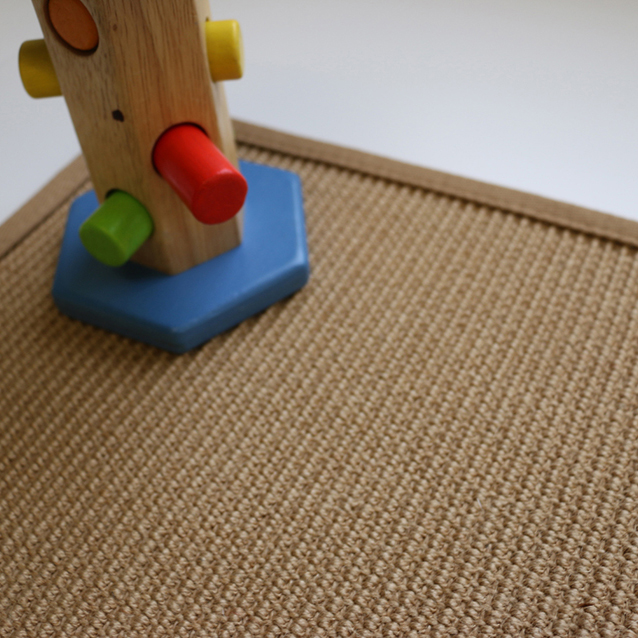
How do you clean a jute rug?
The key to keeping a jute rug clean is really about maintenance. Here are our top tips for maintaining and cleaning a jute rug that we have learned from our many years selling jute rugs.
- Vacuum your jute rug regularly! This will remove not only obvious dirt and debris but also the fine dirt particles that lodge between the fibers and cause additional wear. Plus, it helps to stay on top of the shed fibers.
- Adopt a “no shoes in the house” policy. This prevents dirt, dust, and other rubbish from entering your home in the first place.
- Apply Sisal-Guard to your rugs. Sisal-Guard is a spray-on sealant that you apply to natural fiber rugs and it acts as a barrier to reduce the rate at which sisal absorbs liquid.
- If a spill happens—even just water—act fast. Water can cause browning, and spills can pull dirt to the surface, leaving a dark stain. Scoop solids, then blot gently with white paper towels or a clean cloth. Never rub, as this pushes liquid deeper into the fibers. Always blot from the outside in to keep the stain from spreading.
- If you need to spot clean, we recommend using a dry-cleaning agent. Pretest your cleaning agent in an inconspicuous area and proceed according to the manufacturer’s instructions. Professionally clean as needed. Never steam clean or wet-shampoo your jute rug.
- Review our detailed care and cleaning instructions on our on our Care and Cleaning resource page. Our cleaning instructions are developed with input from flooring installers, customers, and sisal manufacturers. We have advice for any type of stain.
→ Easy to clean alternatives
If caring for your jute rug seems too daunting, that is okay! We have many alternatives that will give you a natural-fiber look without the worry. A stain-resistant sisal, a synthetic sisal, or a SynSisal® weave all make beautiful floor coverings with low maintenance.
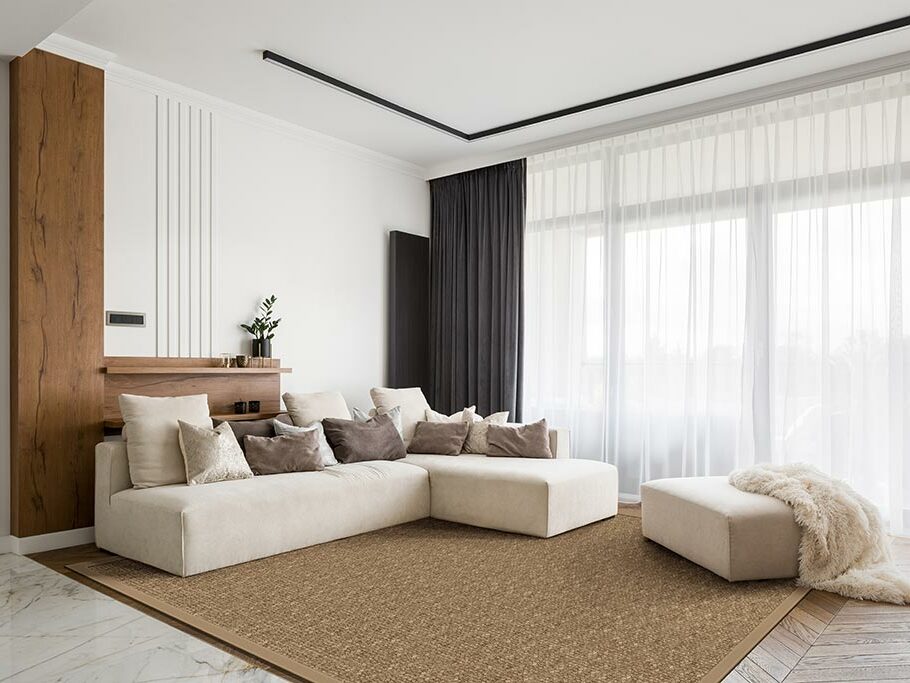
Which design styles work with a jute rug?
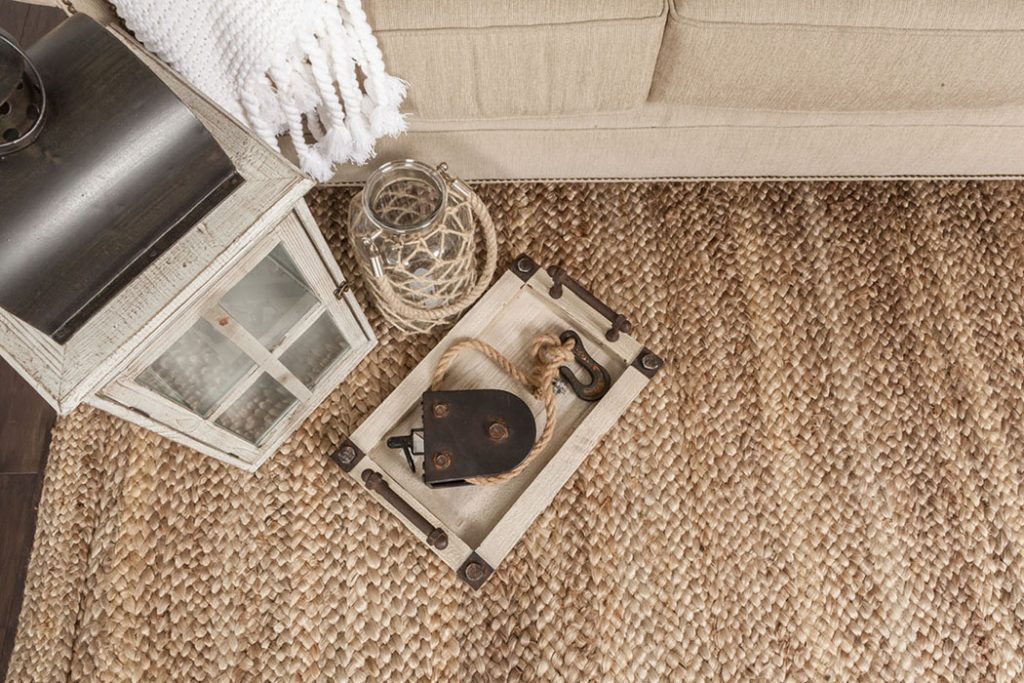
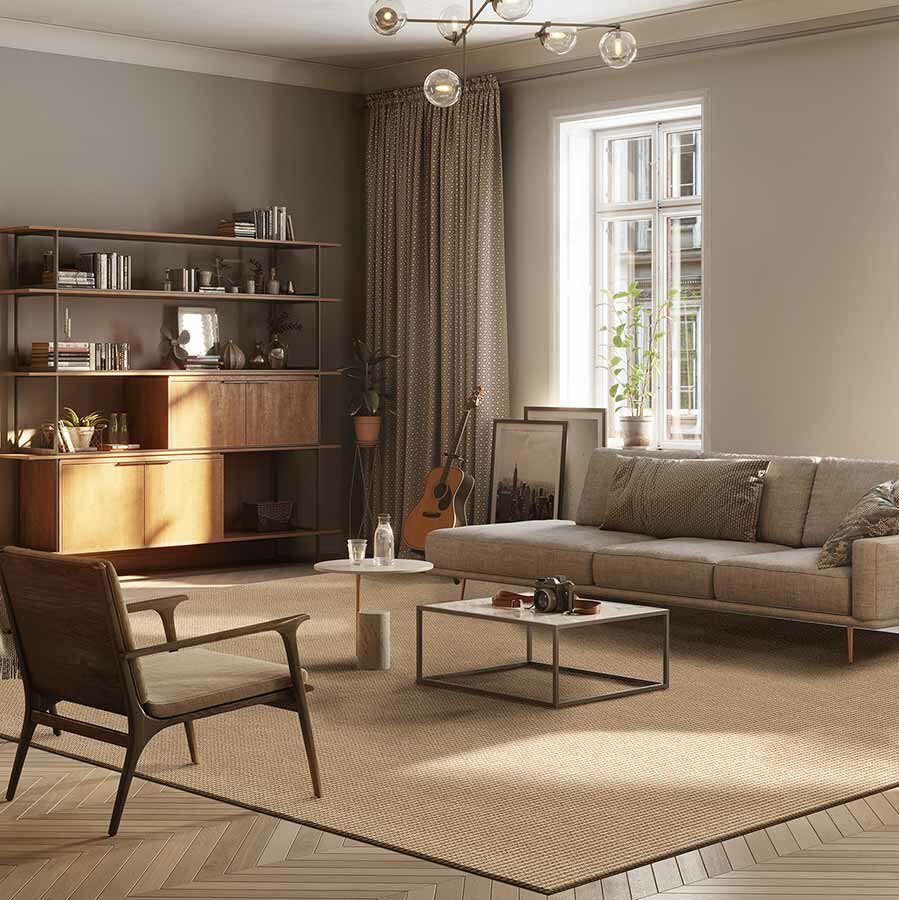
Jute rugs are loved for their versatility, neutral tones, and tactile texture. They have neutral color palettes, interesting textures, and add a much needed natural element into decor. Their natural golden hue—especially in chunky styles like St Martin or Barbuda—adds warmth and character to many interiors. Here’s where jute really shines:
Mid-Century Modern: Flat, tightly woven styles like Tobago or Martinique offer organic texture with a minimalist edge. Learn more about MCM style.
Boho: Chunky, braided jute rugs add energy and texture. Their earthy tones let colorful, collected pieces stand out. Learn more about Boho style.
Coastal: Jute mimics the look and feel of sand underfoot. Pair with casual furniture and ocean-inspired accents. Learn more about coastal style.
Ready to try jute in your home?
Explore our curated jute rug collection — or contact us and we’ll help you find the perfect fit.


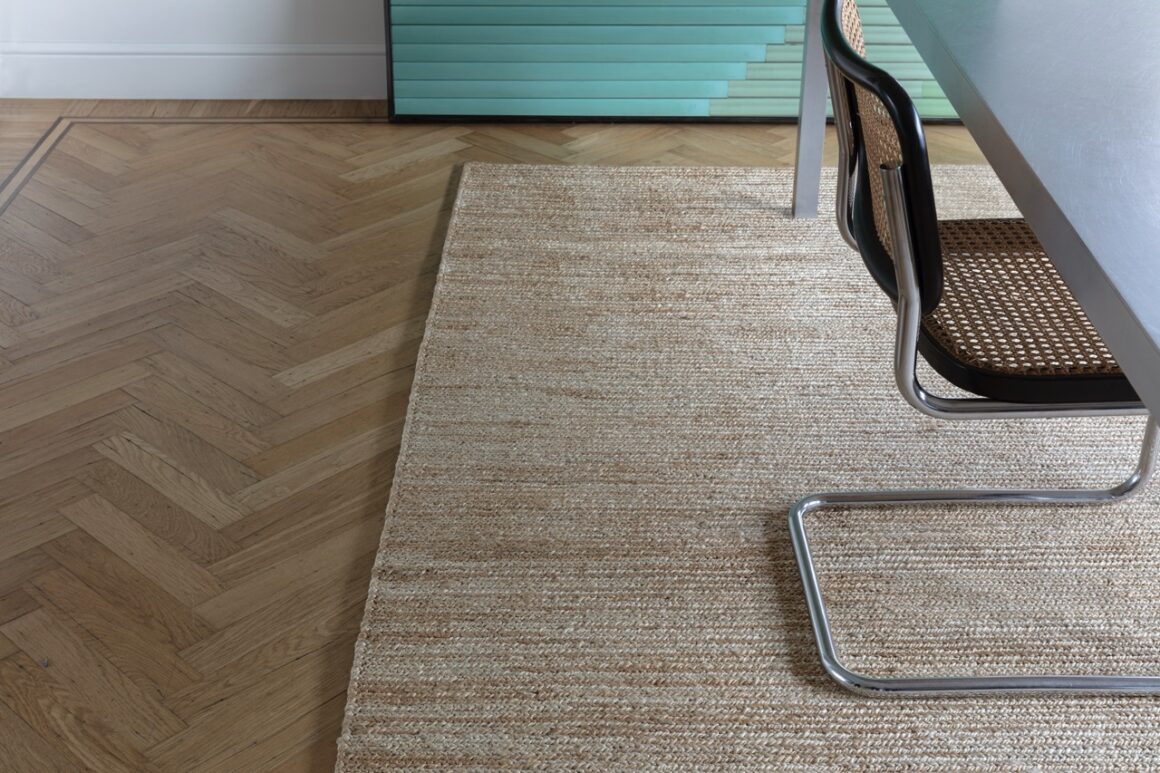
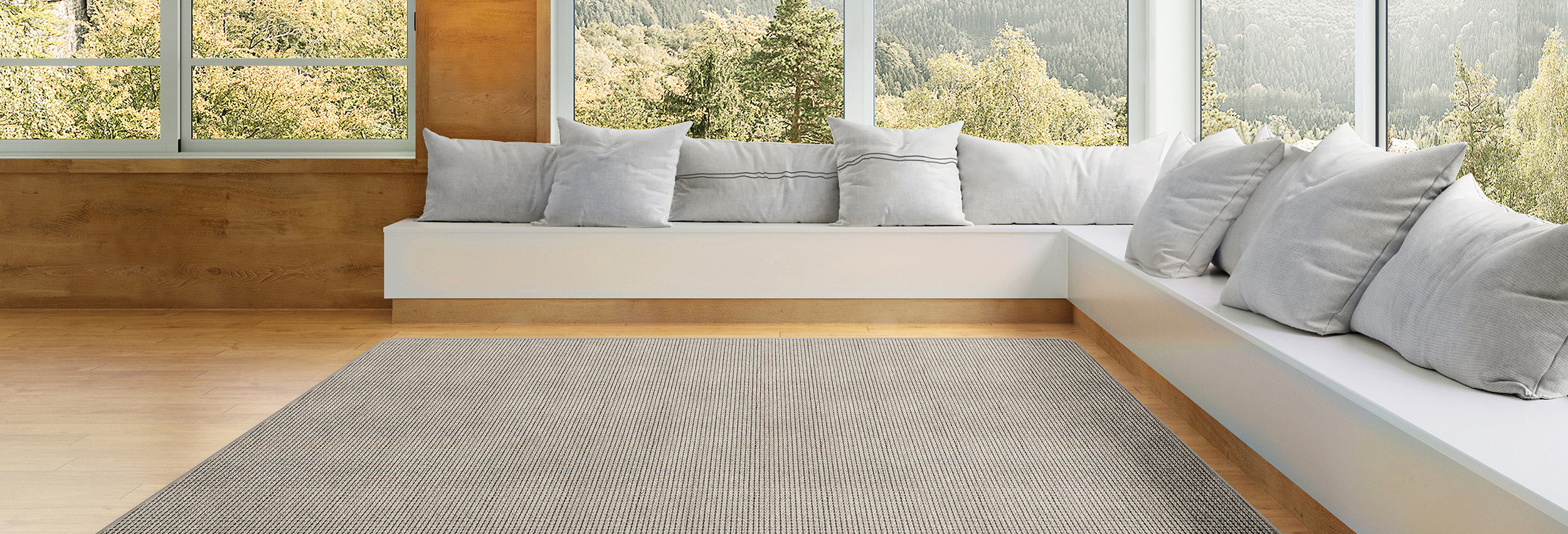
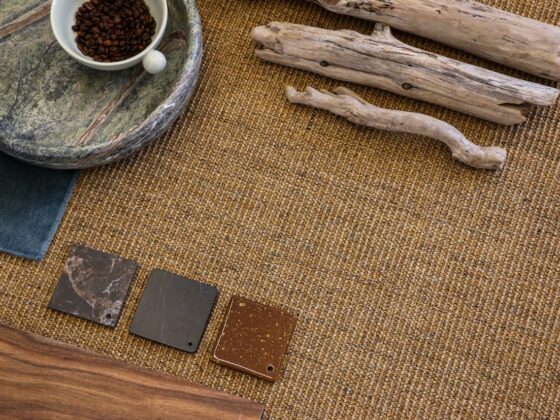
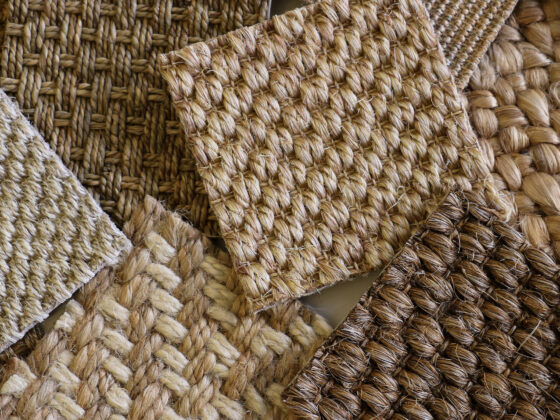

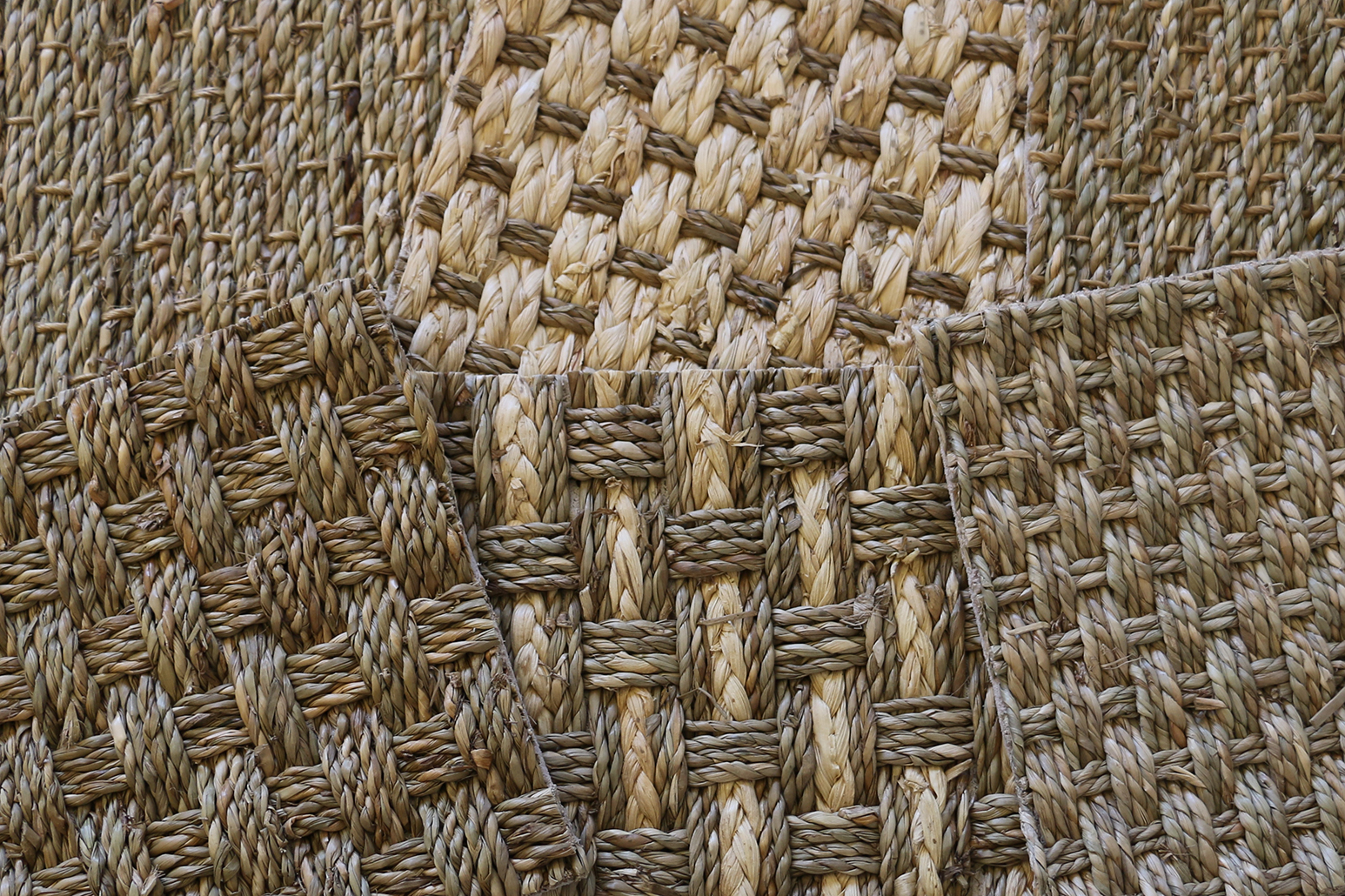
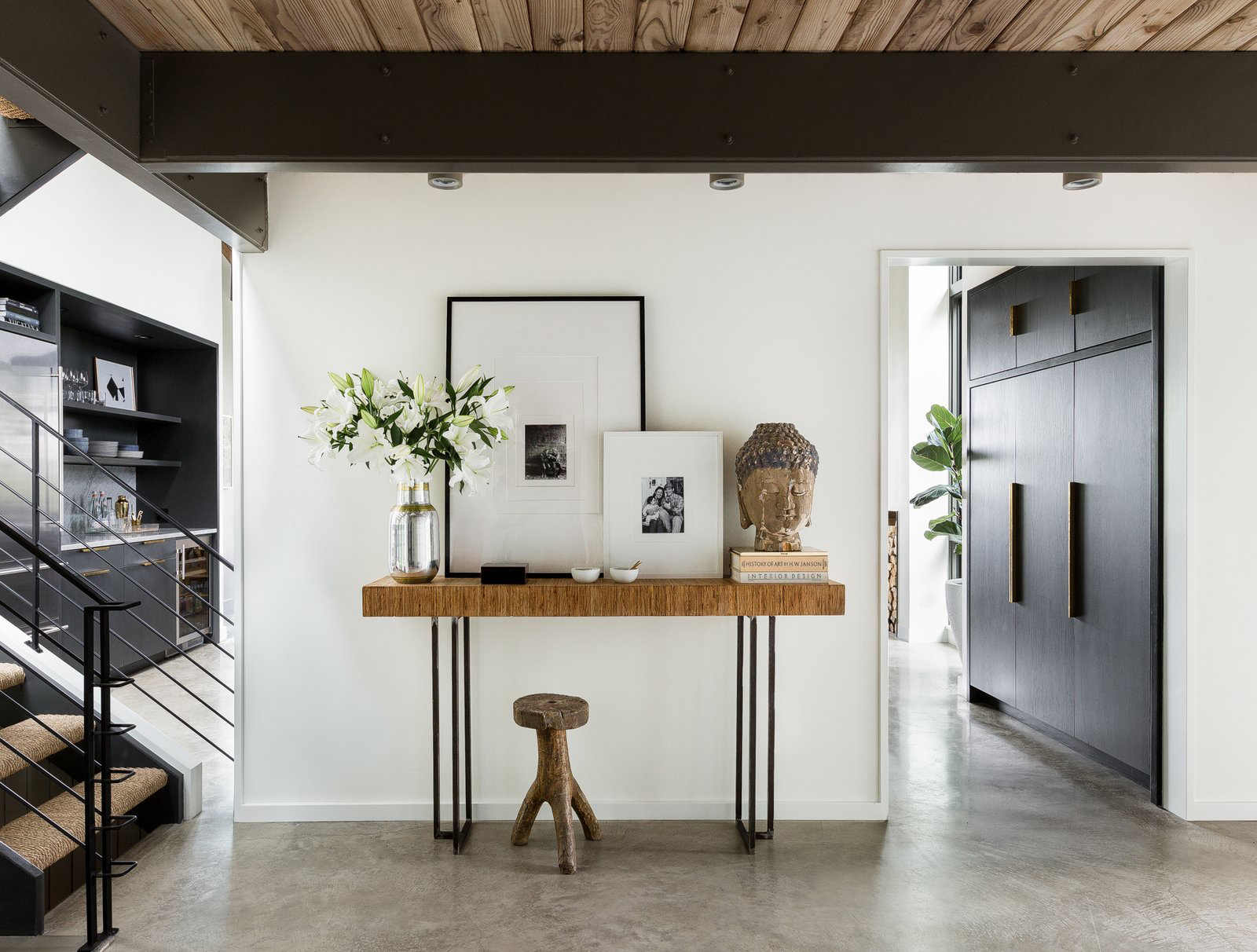
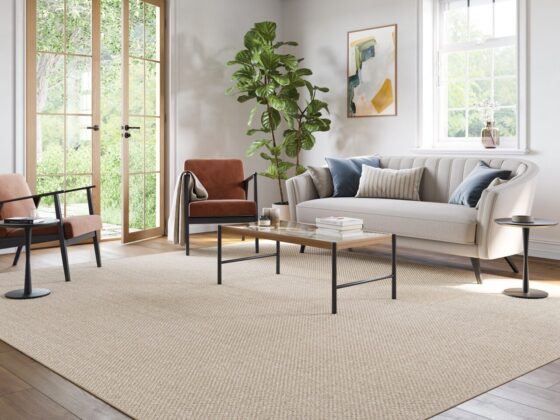
3 comments
Hi I am looking for a custom sized rug that mimics the look of a thick braided jute but it will be in an indoor outdoor space, a calypso style home that is in a tropical climate the area is covered but will be hot and humid I would like to avoid a synthetic rug do you have any suggestions other than this
Thanks
Hi Sloan,
Thanks for reaching out to us with your question. For peace of mind, a synthetic rug is your best option unfortunately. We love our natural fibers here at sisalcarpet.com, but they just don’t fare well outdoors. Fortunately, we have a wonderful collection of rugs that are great for outdoor spaces and have a “natural fiber look.” Please see our synthetics collection. Maybe Oxford or Maui would provide the color and texture you are looking for? Please feel free to reach out with any further questions or comments.
Best,
Christy
Love it, very tidy.